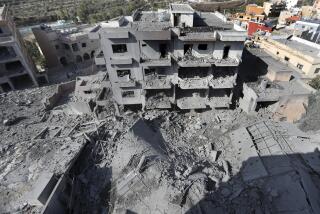Gaza fighting appears to settle into a war of attrition
Reporting from Jerusalem — Amid efforts to revive stalled talks in Cairo, Israeli forces and Palestinian militants in the Gaza Strip traded blows again Saturday, with a volley of rockets fired toward Israel and the Israeli military striking dozens of targets across the coastal enclave.
However, the fighting was far less intense than at the height of the confrontation, which peaked before Israel pulled out its ground forces this week. With Israel having claimed to meet its aims of destroying Hamas-dug infiltration tunnels under the border and eroding militants’ weapons caches, the battle showed signs of settling into a relatively low-level war of attrition.
An Israeli military official, speaking on condition of anonymity, told Israel Radio that rocket fire from Gaza could continue for many more days and that Hamas and allied militants were shifting toward using locally made rockets and mortars with a shorter range than the more sophisticated weapons fired this month at Israeli cities, including Tel Aviv.
Israel, for its part, appeared to be moving toward targeted strikes against militant figures, rather than the large-scale destruction that characterized the early days of the offensive. Those killed in the latest bombardment reportedly included a Hamas official and two suspected militants who were hit as they were riding on a motorbike.
Saturday marked a second day of renewed hostilities in the month-old war after a three-day truce crumbled Friday morning. Palestinian health officials reported eight deaths in the Israeli attacks, including three men killed in a strike on a mosque in the Nusseirat refugee camp in central Gaza.
In the course of the war in Gaza, more than 60 mosques have been destroyed and 150 badly damaged by Israeli strikes, according to Palestinian religious leaders — a tally compiled before the new bombardment Saturday, when more than one mosque was hit. Israel has accused Hamas of using mosques to store weapons and conceal tunnels.
The Israeli military, aware of the sensitivity of striking religious sites, released video Saturday of an aerial strike a day earlier on what it described as a rocket launcher set up adjacent to a Gaza mosque. The video appeared to show the mosque left intact.
The government of Prime Minister Benjamin Netanyahu has come under heavy international criticism for air and artillery strikes that leveled whole residential neighborhoods, with a correspondingly large civilian death toll. More than 1,900 Palestinians have been killed, with human rights groups and the United Nations saying two-thirds of those were civilians. Israel has said up to 900 of those killed were fighters for Hamas or an allied faction.
Netanyahu has forcefully defended Israeli strikes on densely populated areas, saying that every effort was made to warn those living there and that Hamas had deliberately put noncombatants in danger by digging tunnels and setting up rocket-launching sites in civilian areas.
Meanwhile, some Israelis living in the south of the country, which remains the most vulnerable to rocket and mortar fire, are venting anger and frustration at the Israeli defense establishment. The mayor of the southern town of Sderot, Alon Davidi, lambasted Defense Minister Moshe Yaalon, saying he had failed to deliver security, Israeli news reports said.
Efforts to forge a longer cease-fire and address underlying issues have been fitful and rocky but do not appear to have broken down irretrievably. The head of the Palestinian delegation to the Cairo talks, Azzam Ahmed, suggested that indirect talks were going ahead despite disagreements over Hamas’ principal demand, a lifting of a blockade of the coastal territory as a precondition of any cease-fire.
The Israeli delegation left Cairo before the Jewish Sabbath, which begins at sundown Friday and ends at sundown Saturday, but Israeli reports suggested the envoys would return to the bargaining table.
Sobelman is a special correspondent. Special correspondent Maher Abukhater contributed reporting from Ramallah, West Bank, and special correspondent Rushi abu Alouf reported from Gaza City.
Twitter: @laurakingLAT
More to Read
Sign up for Essential California
The most important California stories and recommendations in your inbox every morning.
You may occasionally receive promotional content from the Los Angeles Times.








